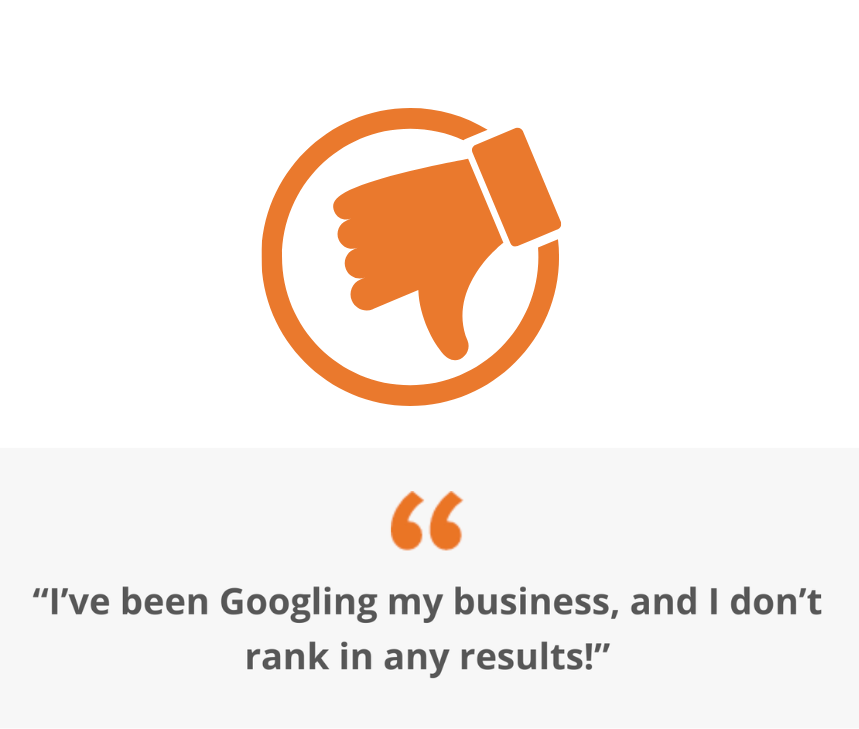Don’t Google Your Own Business & Here’s Why
We get it. It’s tempting to Google your business name to see how your site is doing. It may seem like a harmless thing to do, but in reality, it can be detrimental to your website’s performance. Google is constantly evolving, with algorithms that change almost daily, and what you see when you search is not always what your customers see.
If you Google your business, you could actually be sending negative signals back to Google about your website. Even worse, you might end up making decisions based on misleading information. Here’s why you should avoid Googling your business and what you should do instead.

Why You Shouldn’t Google Your Own Business
- If you Google your business name and it does come up, you’ve put yourself in a bad situation because any action you take next may send less than positive information back to Google regarding your site’s quality.
- You could inadvertently lower your own rank. If you Google yourself, see your website, and don’t click on it, you’ve just told Google that the result it showed you is not relevant for that search. Yikes! Let’s avoid that one.
- If you Google yourself, see your website, and want to avoid sending the wrong message to Google about relevancy, you could click on it. But unless you spend time on your website next and click to other pages (showing engagement), you are sending Google Analytics a bounced visit and pulling down your own website stats. Again, you may be telling Google that the site’s relevancy to your search wasn’t great.
- No two searches are the same. Chances are that there are literally hundreds (or in some cases even thousands) of keywords and phrases that are relevant to what you do/offer that people search for, and it’s nearly impossible to rank highly for all of them with a single page of content. Even the prevalence of voice search these days has altered how and what people search for. Your page may rank well for one term, but not for another, and a single Google search won’t show you this. Start making changes based on a single search term, and you may kill your organic performance on others.
- One search term doesn’t tell the whole story. Two people searching the same word(s) may have completely different search results. While Google says they don’t necessarily “personalize” results in the way you might think, they do take into consideration the context and intent of the searcher. For example, Google knows that I’m located in Hutchinson, MN. It’s also figured out that I often search for businesses and places located here. So if I search for something in the future, I’m more likely to get results relevant to Hutchinson, MN than, say, Hutchinson, KS. Add to this the prevalence and weight of local search results, and what you see may differ quite a bit from that of your potential customer.
- Paid ads can be impacted. If you are doing paid Google Ads, these scenarios also mess with your ad performance and can cost you money. Click on the ad, and you’ve charged your own account. Don’t click, and you’ve made your ad look less relevant to the machine learning algorithms, potentially lowering your quality score which can hinder performance and increase your costs. This is a losing scenario either way!
FAQ’s on Better Ways to Track Your Performance
Instead of searching, use tools that give you accurate, reliable data. Google Analytics and Google Search Console can show you how much organic traffic you’re getting, what keywords are driving visits, and where improvements can be made. Vivid Image clients should connect with their Account Directors to set up the metrics that matter to them and get any help needed to understand the results.
Yes, rankings fluctuate daily, sometimes even hourly. This is normal. The important thing is to look at long-term trends in traffic and visibility, not quick snapshots from a Google search.
Rank tracking tools (most have monthly subscription fees to use them) allow you to monitor specific keywords over time. These tools give you a broader and more accurate view of how your site is performing across multiple search terms. This is a service we can offer to our clients interested in taking their online marketing to the next level. Please ask us!
Focus on the user experience. Create useful, relevant, and shareable content. Sites that provide value get visited more often, shared more frequently, and linked to by others, all signals Google rewards with better rankings.
Data Beats Guesswork Every Time
Googling your own business might feel like a quick check-in, but it can actually harm your performance and mislead you. Instead, rely on data-driven tools, focus on improving your website’s value, and work with SEO professionals who can help guide your strategy. That’s the best way to keep your rankings moving in the right direction.
Need Help Figuring Out How Your Site is Doing?
Use safe, reliable tools and proven processes to gain a quick, accurate snapshot of your website’s performance on Google. Our team will guide you in identifying and taking your next best step, tailored specifically to your goals.
